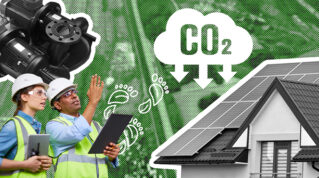The Department for Education has published its draft climate strategy today to become the “world-leading education sector in sustainability and climate change by 2030”. A final strategy will be published in April.
Many of the headline announcements were made yesterday, but we’ve got a full list below (note: this is a list of the new commitments, loads are already going on so we’ve not included).
DfE said it will develop “clear measurable” objectives and publish milestones and targets for 2025-30.
Here’s your trusty Schools Week round-up of the commitments so far.
Climate education policies
By 2022
1. Review subject-specific training to ensure all teachers are “equipped to deliver a knowledge-rich curriculum and improve climate education”.
2. Develop a primary science model curriculum focusing on nature and the recognition of species, including those native to the UK. This will ensure all children “understand the world around them”.
3. Science CPD for teachers will include climate change and sustainability.
4. Explore with schools the “best way to identify champions” to provide leadership on climate change activity.
5. Share examples of “effective, evidence-based climate education” from all education settings so schools can “consider how best to adapt to their own settings”.
By 2023
6. Provide free, “high-quality” curriculum resources so all teachers can “confidently choose those that will support the teaching of sustainability and climate change”. Will be delivered through “clearly signposted and approved platforms”.
7. A virtual “National Education Nature Park” will allow pupils to better understand biodiversity and develop analytical skills. Youngsters are encouraged to do things like install bird feeders and then upload progress and compare against other schools in the virtual park. DfE says this will increase the number of youngsters becoming data scientists and biologists “needed for nature’s recovery” by 2030.
8. Provide framework for the Climate Leaders Award, a Duke of Edinburgh-style scheme.
9. Encourage partnerships to support children learn more about the environment, for example universities linking with schools to share green spaces and climate expertise.
By 2025
10. “Review, refine and build on” the activity within the National Education Nature Park and Climate Leaders Award.
Education estate policies
By 2023
11. All new school buildings delivered by DfE – not already contracted – will be net zero in operation.
12. Test new “energy pods” in schools to provide innovation and replace coal and oil burner heating systems.
13. Provide feasibility studies for schools with end-of-life boilers to switch to new low-carbon heating systems, funded through the Department for Business, Energy and Industrial Strategy’s decarbonisation fund.
14. Start evaluation of UK’s first “biophilic” primary school, including long-term research on effects of green infrastructure on pupil wellbeing.
15. “Support” schools to transition to low-carbon technologies like electric vehicle chargers.
16. Increase active travel to school via schemes such as Bikeability, Walk to School Outreach and School Streets.
17. Develop “locally-tailored presentations” on flood risk and resilience in schools in partnership with the Environment Agency and the Geographical Association.
18. Trial delivery of smart meters in schools to reduce energy bills.
By 2025
19. Evaluate the best value for money approaches for retrofitting education buildings. Develop standards for retrofit and repair to “empower the education estate to make change”.
20. Help schools create “Climate Action Plans” to increase “sustainability literacy” and inform government on rollout of “nature-based solutions” to stop flooding, provide solar energy and improve air quality”.
21. “Encourage” all schools to sign up to flood warnings and have emergency plans in place.
Operation and supply chain policies
By 2023
22. Collect data on food waste in schools and share best practice to improve it.
23. Develop “sustainability and climate change analytical capability” in DfE.
24. “Consider ways” to make the period products scheme more greener.
By 2025
25. DfE and all its arms-length bodies will mandate that suppliers bidding for £5million-plus contracts commit to achieving Net Zero by 2050. They must also publish a “Carbon Reduction Plan” showing how they will meet the target.
26. Review school food standards to “consider the impact of food emissions on the
environment”. Will also look at whether more flexibility can be offered for schools to
“support local sustainability and provide more plant based and meat free options”.
27. “Engage” with schools to “embed sustainability in buying and
ensure ‘green’ frameworks are available to support sustainable purchasing”.
Green skills and careers policies
By 2025
28. Include career opportunity guidance for pupils in relation to technologies used as part of the net zero building programme.
2030
29. Improve take-up of STEM subjects “ensuring that anyone, regardless of their background, has the opportunity to pursue a rewarding career” in a STEM occupation.
Who will oversee what?
Education secretary Nadhim Zahawi will be the department’s “climate change minister”. He will directly oversee the Climate Leaders Award.
Schools minister Robin Walker will take on climate education, while academies minister Baroness Barran oversees the biodiversity of the education estate and net zero building targets.
DfE will also identify a non-executive director to lead on climate change.














Worthy but lacking in real ambition. And a chance to bung money at the ‘approved platforms’. A far more ambitious programme would be to install solar panels on state schools complete with batteries to store solar-generated energy. Expensive, yes, but would save money in the long term. Far better to use existing roofs than taking land out of production for solar farms.